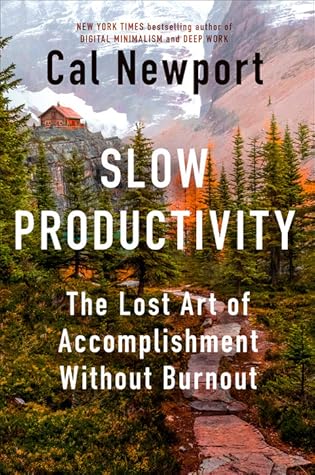More on this book
Community
Kindle Notes & Highlights
by
Cal Newport
Read between
April 24 - April 27, 2024
PRINCIPLE #3: OBSESS OVER QUALITY Obsess over the quality of what you produce, even if this means missing opportunities in the short term. Leverage the value of these results to gain more and more freedom in your efforts over the long term.
It’s in the obsession over what you’re producing that slowness can transcend its role as just one more strategy on the arid battlegrounds of work-life wars and become a necessary imperative—an engine that drives a meaningful professional life.
Agree with this. Everything else rests on trust, which builds with quality. You get a lot more leeway and autonomy if people know they dont need to worry about you
Even in knowledge work, however, if we look closer, we can often find hidden among our busy to-do lists one or two core activities that really matter most.
“Deciding what not to do is as important as deciding what to do,” Jobs explained.
We’ve become so used to the idea that the only reward for getting better is moving toward higher income and increased responsibilities that we forget that the fruits of pursuing quality can also be harvested in the form of a more sustainable lifestyle.
In his exposition, Glass focuses on the gap that often exists between taste and ability—especially early on in a creative career. It’s easier to learn to recognize what’s good, he notes, than to master the skills required to meet this standard.
Glass argues that it’s in our desire to squelch this uneasy self-appraisal—to diminish the distance between our taste and our ability—that improvement happens. His exhortation to those just beginning their careers is to keep putting in the work, as it’s only through this deliberate effort that the gap will close. All of this is solid advice,
But there’s a reason why MFA programs are so common among successful writers: they provide an effective training regimen for literary taste.
Or, you know, just cultivate and read good books. I would guess MFA is more about the structure than anything else, which is a bit counter to his thesis here. The point isnt freedom. You actually need dicipline o be free. Its about simply having more bandwidth to think deeply. Simple as that
In my book Digital Minimalism, I had written extensively about the importance of high-quality leisure activities. It wasn’t until I hit that notable midlife birthday that I realized I wasn’t following my own advice.
Lol tbis seems on the nose. Too on the nose really. My major critique of Cal, he himself doesnt seem to be a deep enough thinker for what i prefer. Its too Tim Ferris with his book volume targets, etc. Hes internalized his ideas in his mind, but not in his soul
Most of my recent nonfiction books, for example, tend to deploy a style that I informally call “smart self-help,”
Confronting the gap between what the masters produce and your current capabilities is disheartening. When you study an unrelated field, the pressure is reduced, and you can approach the topic with a more playful openness.
There’s also a focusing effect that comes from performing for a crowd. When you want to impress other people, or add to the conversations in a meaningful way, your mind slips into a higher gear than what’s easily accessible in solo introspection.
The general idea that quality tools can increase the quality of your work is not unique to my early academic career.
The pursuit of quality is not a casual endeavor. If you want your mind on board with your plans to evolve your abilities, then investing in your tools is a good way to start.
When your output is only one step among many on a collaborative path toward creative progress, the pressure to get everything just right is reduced.
He would bring his portable typewriter with him to fill spare moments writing, including during vacations or while attending course lectures that failed to keep his attention. “Anyone who wanted to look at my transcript . . . could see when I was working on a book,” he admitted.
As he explained in Draft No. 4, he would begin by copying all of his observations from his notebooks, and transcribing all of his tape-recorded interviews, onto fresh pages, pounded out on an Underwood 5 manual typewriter. “The note-typing could take many weeks,” he explains, “but it collected everything in one legible place, and it ran all the raw material in some concentration through the mind.”
This target audience covers large swaths of the knowledge sector, including most freelancers, solopreneurs, and small-business owners, as well as those in fields like academia, where great freedom is afforded in how you choose and organize your efforts.
This is enlightening and helpful framing. So really not going after most knowledge workers, the ones in Govt or Corp america
A few months after these triumphs, Miranda would find himself lounging in a pool on a much-needed vacation in Mexico, failing to find relaxation because his attention had been captured by a doorstop of a book he had impulsively purchased before his trip. It was a biography of Alexander Hamilton.


